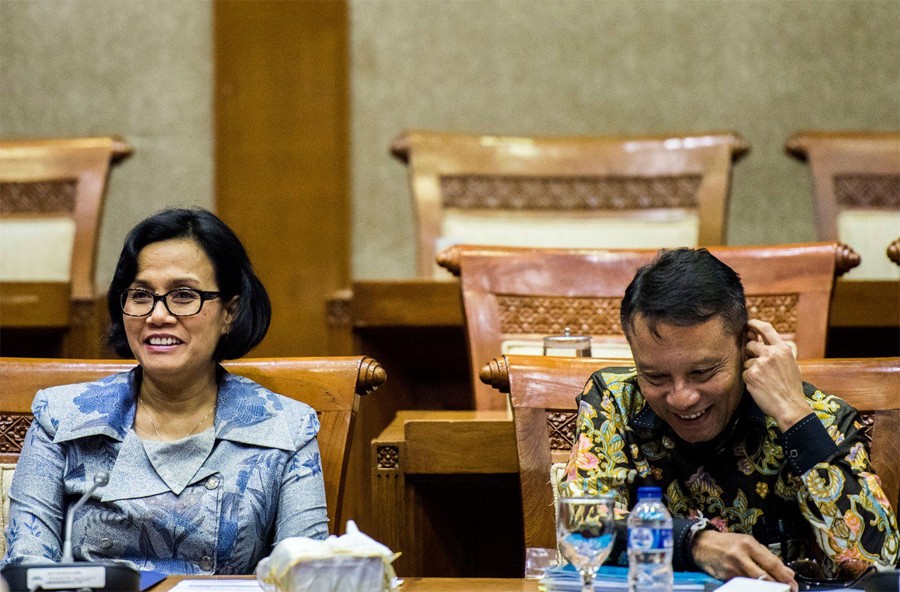Popular Reads
Top Results
Can't find what you're looking for?
View all search resultsPopular Reads
Top Results
Can't find what you're looking for?
View all search resultsState spending in hot seat
Change text size
Gift Premium Articles
to Anyone
I
ndonesia’s economy slowed in the third quarter, as widely expected, with a government spending contraction in the spotlight despite high hopes for the state budget to stoke growth amid unfavorable economic conditions.
The country’s gross domestic product (GDP) growth slowed to 5.02 percent in the July to September period compared to the same period a year ago, lower than the 5.19 percent in the previous quarter because of declining government spending and exports.
Economists highlighted the minus 2.97 percent contraction in government spending because it was the one segment that was previously expected to properly grow amid global economic uncertainties that have severely affected exports while domestic consumption and investment remained stable.
“Without sustained improvement in export earnings, about the only possible boost to GDP growth would need to come from government spending,” said Gundy Cahyadi, a Singapore-based economist with DBS Bank.
The lower government spending in the third quarter is attributable to austerity measures taken by President Joko “Jokowi” Widodo’s administration following a Rp 137 trillion state budget cut made in early August and calls directly from the President for efficiency measures on less important spending, economists said.
The weak government spending became a concern for economists because it was also reflected in a decline in investment figures. Investment rose 4.06 percent in the third quarter year-on-year (yoy), contributing almost a third to the nation’s economy, lower than the 5.06 percent recorded in the second quarter.
UOB economist Ho Woei Chen said the government’s budget spending cut would continue to weigh in on the outlook for economic growth in the fourth quarter, but overall the economy would benefit from stabilization of oil and commodity prices.
President Jokowi said he was optimistic that government spending would be better disbursed in the final months of the fourth quarter.
“We expect that the budget realization rate would be slightly better [in the fourth quarter], although we should also understand that the global economy is in a position that continues to decline,” he said, responding to journalists’ questions after an event at the Army headquarters.
The Central Statistics Agency (BPS) explained that the government spending contraction occurred because of administrative spending, with the civil servants’ bonuses now paid in the second quarter as opposed to the third quarter last year.
“There was also a decline in realization of government spending in goods,” BPS head Suhariyanto said.
Going forward, the government’s ongoing tax amnesty could help provide more revenues and a seasonal spike in budget disbursement toward the end of the year is expected to drive growth in government spending, economists said.
“Government spending could be higher in the fourth quarter as the government usually increases consumption at year-end to meet the budget target, alongside reimbursement of project costs to contractors,” said Kenta Institute chief economist Eric Sugandi.
The government is aiming for economic growth of 5 percent this year and 5.1 percent in 2017, higher than the 4.79 percent last year — the lowest rate in six years — against a backdrop of weak global demand and business appetite.
 (Source: Central Statistics Agency (BPS)/File)
(Source: Central Statistics Agency (BPS)/File)
Meanwhile, domestic consumption, which accounts for more than half of the country’s economy, grew by 5.01 percent yoy, about the same level as in the past few quarters.
OCBC Bank economist Wellian Wiranto said the overall household consumption sector remained robust enough to continue being a key support for growth in the fourth quarter and into next year.
“Overall, the third quarter GDP print, while proving to be slightly disappointing, still suggests to us that the economy is bottoming out and would likely pick up modestly next year,” he said, predicting an average growth of 5 percent and 5.2 percent in 2016 and 2017, respectively.
Bank Indonesia (BI) also forecast stronger consumption in the fourth quarter stemming from campaigns for the simultaneous regional elections, while also expecting the impacts from the implementation of 13 economic stimulus packages issued in September 2014 to bear fruit.
Prima Wirayani contributed to the story
_________________________
To receive comprehensive and earlier access to The Jakarta Post print edition, please subscribe to our epaper through iOS' iTunes, Android's Google Play, Blackberry World or Microsoft's Windows Store. Subscription includes free daily editions of The Nation, The Star Malaysia, the Philippine Daily Inquirer and Asia News.
For print subscription, please contact our call center at (+6221) 5360014 or subscription@thejakartapost.com










